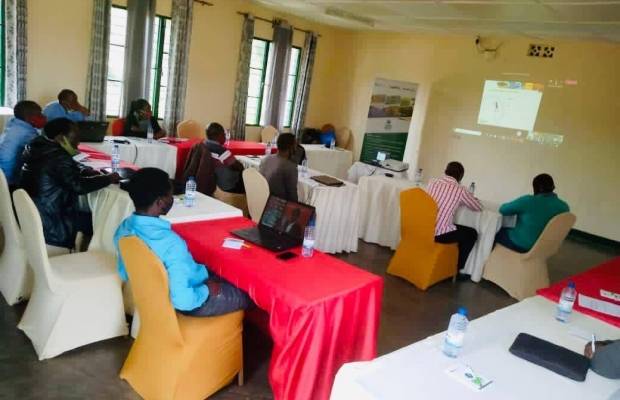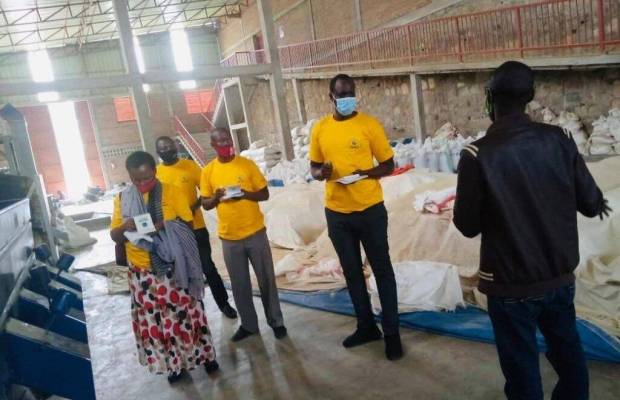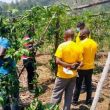SEADWest facilitated field activities and a training of trainers on food safety and quality management
SEADWest contributes to a society’s sustainable and inclusive development by providing access to education and training for professionals and organisations in technical vocational education and training (TVET) and higher education. Back in November 2020, the project facilitated field activities with SMEs Counsellors and a training of Trainers on food safety and quality management.
Field activities with SMEs councellors
Across the globe, small and medium enterprises (SMEs) are the lead drivers of job creation and economic development. In Rwanda, According to the Rwandan Ministry of Trade and Industry, 98% of businesses are considered SMEs, contributing 41% of all private-sector jobs in the nation.
Making existing and new SMEs more competitive in value addition, Small and medium enterprise-strength need to come from the ability of smaller firms to react quickly and flexibly to adapt to market realities and to take advantage of opportunities that would not be an advantage to larger firms.
Following the ToT training sessions provided to its Partners from academic Institutions on SMEs coaching and counseling, SEADWest has organized and facilitated field activities with the trained SMEs Counsellors.
From 5th -9th October, SEADWest organised field visits for its Partner Institutions who were trained to get associated and acquainted with the identified businesses from Karongi, Ngororero and Rutsiro districts to gain business counselling experience, as well as introducing the project’s activities and its interventions, to further identify and prioritize the needs of these businesses in line with project interventions.
The team visited many small businesses including Inyange wine works ltd, KOPAKAMU ltd, COOPAKADUCHE, etc and made business stocktaking by gathering all basic businesses information and specific business development and creating the database of personal development for the Counsellors to further explore how each business can be counselled/advised further.
The objective of the field visits were; Stocktaking of businesses, understanding the challenges they faced and their development, counselling the businesses, predicated the sensitivity towards SMEs and their development, identified key areas of personal and professional development. the trained business Counsellors had a chance to associate and acquaint with at least two SMEs both start-ups and surviving businesses.
‘’We gained experience through acquitting with SMEs and through understanding their challenges committed to develop future counseling package. I will use the acquired skills in advising not only small a businesses but also my school as well as students about how to run a business and the challenges in businesses that they need to avoid’’ Vedaste Tuyisenge. IPRC Karongi
The field visits were very productive and appreciated by businesses. businesses were welcoming to future counselling activities and committed to keep engaged. This indicated how important counselling intervention toward improving the businesses is important.
This field visit was followed by the workshop in November to provide overall feedback to all counselling teams which helped them to be able to; analyse business counselling context on matters important to business success , hypothesize counselling skills which will help in solving business challenges, determine business counselling special abilities and the right attitudes and assess inspiration of business counselling success towards attainment.


A training of Trainers on food safety and quality management
From 9-13 November 2020 the SEADWest project facilitated a training of Trainers on food safety and quality management to all the agritourism core team, which is comprised of Lecturers from IPRC Karongi, Gisovu TVET School, Bumba TVET School, EAV Kivumu, District cash crop Officers.
The training aimed at supporting both the hospitality and horticulture farmers/cooperatives to comply with the food safety and quality standards and their respective Service Training & Innovation Centre (STIC) as the centre will need to comply with the food safety and quality standards.
The training was facilitated by Victor Volker from Q- Point together with the SEAD local team and they focused on the different aspects of food safety and hygiene in the hospitality sector, hazard analysis and critical control point and HACCP 7 principles and Codex 12 step plan, hazard analyses and risk assessment, explaining the standards involved in food safety, procedures and instructions for food safety and quality management, setting-up of a general management system and assigning the team practical exercises based on quizzes in different sessions.
After the classroom session the team visited a professional kitchen based in Karongi and learnt the list of prerequisites the hospitality company should practice according to the codex food hygiene standard.
As testified by Participants; they improved their understanding and acquired more skills on food safety & quality management in the Hospitality sector as well as aspects relevant to the Agro-tourism and hospitality value chains, they got familiarized with the 12 steps of the implementation of (HACCP) food safety systems. At the end of the training they were able set up a basic quality and food safety- management system according to international standards and were able to plan and execute and internal audit.
“I attended the food safety and quality management training where I gained knowledge on food hazard control, I got more skills in this training which will be used to train our community restaurants, hotels and outlet owners on how they can do food hazard control where it is not done. In addition to this we will start teaching our school cooks/chefs how to prepare food for students”. Ingabire Alice, Trainer of crop production from Gisovu TVET school.
Source: SEAD
About SEADWest
The SEAD-West project is managed by Maastricht School of Management (MSM) and is strongly aligned to the currently running SEAD project under Nuffic NICHE. Where SEAD is focusing on the poultry, dairy, horticulture and potato value chains in the Northern, Eastern and Southern provinces, SEAD-West is contributing to food & nutrition security in Western province of Rwanda. The project will build new and strengthen existing partnerships to boost agricultural value chain development and ensures equal opportunities, labor market relevance and strengthening management of the chain actors for sustainability.
Orange Knowledge Programme
This project is part of the Orange Knowledge Programme (OKP) which is funded by the Netherlands’ Ministry of Foreign Affairs and managed by Nuffic. For more information click here
Read more
The SEAD and SEADWest projects conducted a training on Gender and Social inclusion for the horticulture value chain teams / lecturers from partner institutions
Final Management and Leadership training for Rwandan partner institutions provided online
Improving project management hard and soft skills
SEAD-West partner institutions prepare for curricula development with a look and learn tour

